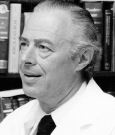One of the early giants in the field of cancer prevention, Lee W. Wattenberg, MD, died on December 9, 2014, at the age of 92.
A native New Yorker, Dr. Wattenberg received his BS from City College of New York in 1941 and then went on to attain his medical degree from the University of Minnesota School of Medicine. He later became a distinguished faculty member for more than 60 years. Dr. Wattenberg attributed his lifelong passion for cancer prevention to his work as a junior biologist with the Medical Research Group of the Manhattan Project, whose efforts were dedicated to studying the effects of radiation as it related to the development of the atomic bomb.
In 1966, Dr. Wattenberg published what would be regarded as a landmark paper in the American Association for Cancer Research (AACR) journal Cancer Research. During his research, he reviewed 36 years of animal studies, looking at the effects of various compounds on carcinogenesis, which set forth the framework for understanding how these compounds worked. It was in this seminal paper that Dr. Wattenberg introduced the term “chemoprophylaxis.” This work recognized the promise of the field of cancer prevention, playing a prominent role in its evolution.
His Many Accomplishments
Dr. Wattenberg served in the army during the Korean War; he was stationed at Walter Reed Hospital, performing research to aid the war effort. During his long and illustrious career, Dr. Wattenberg contributed prolifically to the scientific literature, constantly advancing the field of cancer prevention. He would later investigate two categories of chemopreventive agents: synthetic compounds that might prevent carcinogen-induced lung cancer, and dietary constituents, such as the cruciferous plants cabbage and broccoli.
He also studied the processes that cause irreversibility in carcinogenesis and sought to determine whether and how these processes could be targeted for intervention. Adding to his list of research accomplishments, Dr. Wattenberg also pioneered the use of aerosols to deliver drugs in lung cancer.
Dr. Wattenberg was president of the AACR from 1992–1993 and was elected as a Fellow of the AACR Academy in 2013. His many contributions to the AACR included terms as Associate Editor for Cancer Research and Cancer Epidemiology, Biomarkers & Prevention. He chaired the first cancer prevention symposium at the 1979 AACR Annual Meeting, served as the chair of the Annual Meeting Program Committee in 1982, and was a featured speaker at the AACR conferences on Frontiers in Cancer Prevention Research. Dr. Wattenberg also served on the AACR board of directors from 1985–1988 and from 1991–1994. During his presidency, he launched the Associate Member Council in 1992 to represent the interests of early-career scientists.
‘A Lasting Legacy’
In a tribute to Dr. Wattenberg, Margaret Foti, PhD, MD, Chief Executive Officer of the AACR, noted, “About two-thirds of all cancers are preventable. Because of Lee Wattenberg’s dedication to and belief in the promise of cancer prevention, the field has taken its rightful place as one of the most important areas of cancer research,” she noted. “Lee has inspired the work of a whole generation of cancer prevention researchers, which, in addition to his own personal contributions, will leave a lasting legacy of saving lives from cancer.”
Colleagues across the nation fondly remembered Dr. Wattenberg as a self-effacing teacher and scientist who rightly deserved recognition as the “Father of Chemoprevention.” He is survived by his wife of 70 years, Esther; four children; eight grandchildren; and a great-granddaughter. ■


